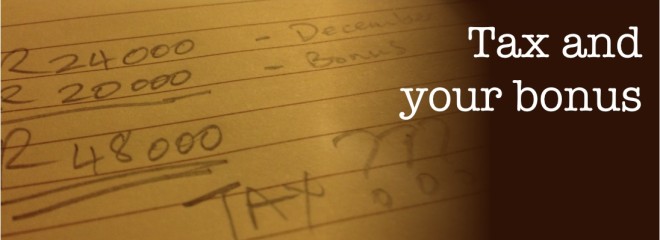WILL THE AWARD OF A BONUS EVER PLACE YOU IN A WORSE FINANCIAL POSITION?
(Anthony Priday)
At the end of the year it is customary in many businesses to award bonuses to their staff. Often, this is in the form of a 13th cheque, but this is not always the case. Either way, the bonus will increase the annual income earned by the employee.
Whilst travelling into work I was concerned to hear an interview with the chairperson of the South African Institute of Accountants. During this interview, a strong perception was created that those who receive a bonus could find themselves earning less than what they would have had they not been paid a bonus.
This can never be true.
Our tax tables (in South Africa) are structured in such a way that if you earn more before tax, you will earn more after tax too. The percentage of tax payable does change, but only for the amount that is in the next tax bracket.
Let me explain:
Frank earns R10 000 per month, he receives no fringe benefits nor deductions and he is younger than 65. Without a bonus, his tax is calculated at R120 00 for the year. From the table below it can be seen that Frank will pay 18% tax on his R120 000 annual income less the primary rebate of R12 080 (R120 000 x 18% = R21 600, less the primary rebate of R12 080, giving a tax total for the year of R9 520)
Frank’s monthly tax payments on his standard salary would be R793.33.
Now assuming Frank earns a R10 000 bonus, his gross income for the year would be increased to R130 000 (tax on R130 000 is calculated as follows R130 000*18% = R23 400 less primary rebate of R12 080 =R11 320).
Given that R9 520 has already been deducted on the salary component, only the difference will be deducted from the bonus (R11 320 – R9 520 = R1 800).
So Frank takes home a bonus of R 8 200. He is certainly not worse-off for earning a bonus!
The calculation is more complex when the bonus results in the annual income moving to the next tax bracket. Let’s take a quick look.
Lucy earns a salary of R20 000 per month, this places her in the second tax bracket (see table below). She then receives a bonus of R20 000, which pushes her annual income into the third tax bracket.
Lucy’s gross income (inclusive of bonus) would be R260 000. R1 250 of the bonus (R260 000 – R258 750) would be taxed at 30% (R375 tax) and R18 750 (R20 000 – R1 250) would be taxed at the lower tax rate of 25% (R4 687.50). Total tax on the bonus would therefore be R5 062.50.
Lucy, after tax, will take home a bonus of R 14 937.50 – again, she is better off having earned a bonus!
It’s important to note that the increased tax percentages only apply to the amount earned within the new bracket, which is why you will never be worse off for earning a bonus.
Tax tables for the 2014 year of assessment
Individuals, Estates and Special Trusts

